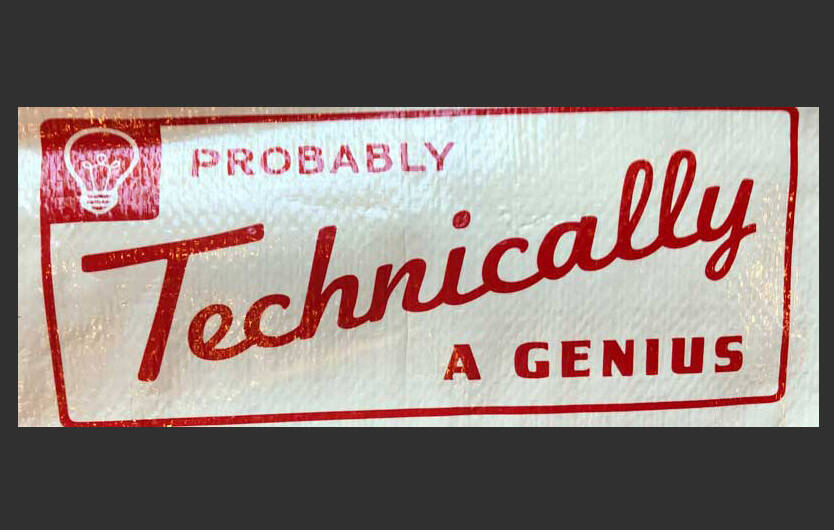By Morf Morford, Tacoma Daily Index
Several years ago, when I was still teaching at the college level, a fellow teacher from our shared office came in with, to me at least, a peculiar revelation – “I have an opinion about everything! You could ask me about any topic and I can put out an instant opinion!”
I have to admit that it was true – no matter the issue, and no matter what any one else’s training or life experience might reveal, she had an opinion – welcome, or informed or not.
As I mentioned, this was several years ago. I never would have imagined that this particular mind-set (that some of us have near-instant opinions that must be voiced at every opportunity) would become the prevailing conversation or set of assumptions on every topic from immigration to taxes to what we should all be eating to the endless “you’re doing it wrong” theme of many online postings.
Blame it on the internet
Thanks to the internet, it has been said, we are surrounded by experts on everything. From issues like the Second Amendment to economic theory and business trends, to modern music and the state of local streets or public schools, thanks to social media memes and the rants, slogans and diatribes, those who pretend to know everything are everywhere – and the louder they get, the more convinced they seem to get.
A little knowledge, as you may have heard, is indeed a dangerous thing. And we have “experts” on talk shows or even in elected offices who have very “little” knowledge. And they, like my teaching colleague, seem to be proud of it – in fact, for many, the reigning principle seems to be “the less I know, the better”.
There was a time, not so long ago when the word “expert” didn’t need to be in quotation marks. An expert was simply a person with years of study or experience or both. And, besides being knowledgable, they were fully aware of how much more there was to learn in any given area of study.
These were not the purveyors of instant opinions – these were measured, insightful, life-time learners who knew full well the limits of their own knowledge – and the complexities, contradictions and outright absurdity of much of human endeavor.
Some of us remember life before the internet. The internet, we were told, and many of us believed, would be a place where there would be no arguments because truth could be easily and immediately verified and falsehoods debunked just as quickly.
The past several years have shown that we seem to have learned a very different lesson from the internet – any idea, theory or rumor, no matter how preposterous or obviously false seems to gain traction in our media and personal conversations.
The much heralded “age of information” has instead become an age of clickbait, misleading ads, scams and “alternative facts”.
We are swarming in information so we think we must be smart. Or at least smarter than “those” people, especially those from other cultures – and certainly those who came before us. I have a simple word to individuals who believe such things – you are not.
Read a book from one hundred – or five hundred years ago; if you can.
Not only are the vast majority of us in staggering ignorance of the dynamics of the issues that beset us from homelessness to addiction to suicide and crime, we can’t even see what our real challenges are.
As we evade our real issues, those that disrupt or even endanger our daily lives and livelihoods, we obsess over artificial, even absurd struggles we can watch or cheer on from a safe distance like sports, video games and so-called culture wars.
Too many of us would far rather argue about M&Ms or children’s books than constructively address any actual urgent issues.
Banning (and breathlessly hyperventilating about) books comes naturally and easily to a culture primed to fear ideas, history and, above all, what we thought we already knew.
And that’s the problem – too many of us assume that we already know everything there is to know – about everything.
Knowingness
There’s a word for this self-imposed brain paralysis – knowingness.
I saw it more and more in local colleges. The irony of course is that more and more young people (who literally know very little) would pay to go to college to learn – and would literally refuse to learn anything.
This wasn’t stupidity or even laziness – it was something much deeper and stronger and – oddly enough, few of my foreign students seemed to have the same problem.
Foreign students, at great cost and sacrifice to themselves and their families, went to college to learn things – and they actually did – eagerly and consistently – and at higher and higher levels.
Refusing to learn has no redeeming benefits. It leads to fear and resentment of any new idea or approach, and forces us even further into the familiar and comfortable.
Young people in particular are ill-equipped to face or address standard life challenges.
I have seen children and young adults cry and break down when confronted with basic needs or skills like writing an essay or fixing a meal. For all too many of them, they “know” everything, but can’t “do” anything.
And, as I mentioned above, when we get too comfortable, we invent our own struggles and battles from bathrooms to textbooks.
Those people who think they know everything are a great annoyance to those of us who do. – Attributed to Isaac Asimov (author of dozens of books on everything from science fiction to the Bible)
Ignorance, pettiness and endless fear and grievance has been the calling card of too many of our leaders and media talking heads.
So called “influencers” make fortunes from fear and gullibility on every media platform.
Ignoring our history has become a political mainstay for too many career politicians. They, like some strange ancient beast, make noise and raise temperatures, and add nothing but static to our national conversations.
There is another way, an eternal, enduring way; One must say Yes to life and embrace it whenever it is found — and it is found in terrible places; nevertheless, there it is. For nothing is fixed, forever and forever and forever, it is not fixed; the earth is always shifting, the light is always changing, the sea does not cease to grind down rock. Generations do not cease to be born, and we are responsible to them because we are the only witnesses they have. The sea rises, the light fails, lovers cling to each other, and children cling to us. The moment we cease to hold each other, the moment we break faith with one another, the sea engulfs us and the light goes out. – James Baldwin
The problem with being “smart” or even just crammed and overwhelmed with information, facts and points of view, is that we don’t have room for anything new. Almost any thought or idea, on almost any topic is either overwhelming or threatening. And approaching any topic as a new adventure becomes even more unlikely. In other words, for many of us, our brains are full and we just can’t learn anything else.
Those who think they know it all have no way of finding out they don’t. – Leo Buscaglia
I have a word to the wise, or at least those who presume that you know everything. You don’t. None of us do, and none of us could.






